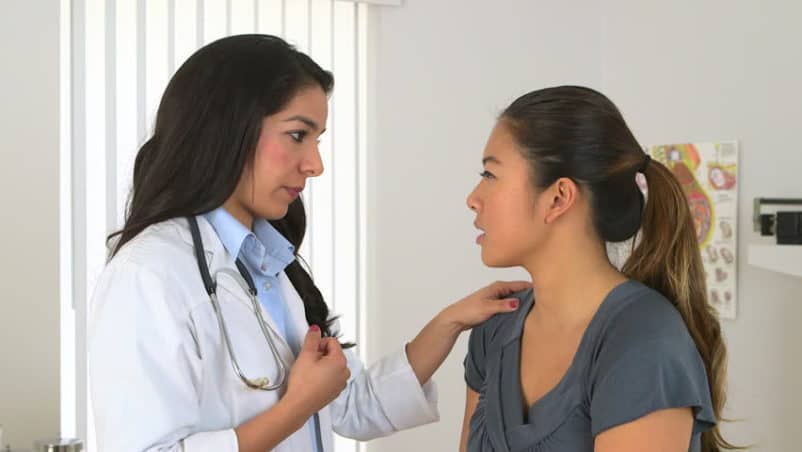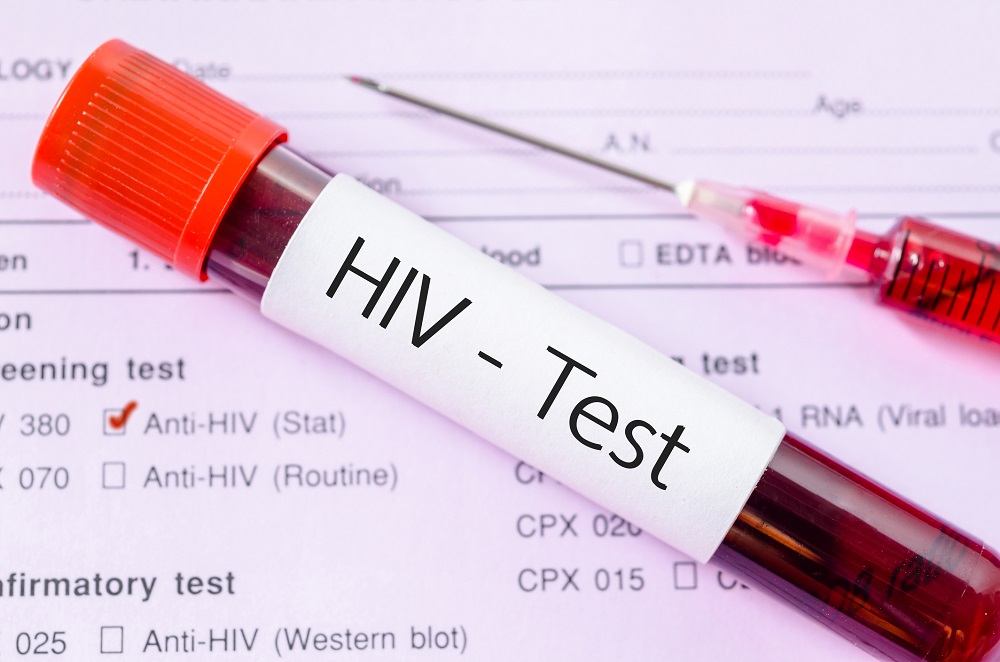Contents:
- Medical Video: How To Know If You Have STD or AIDs?
- Women are more at risk of contracting venereal disease than men
- Sexually transmitted diseases are most often contagious
- 1. Chlamydia
- 2. Gonorrhea
- 3. Trichomoniasis
- 4. Genital herpes
- 5. Human papillomavirus (HPV)
- 6. Hepatitis
- 7. HIV
- Are there any signs that must be considered after sex?
- Vaginal bleeding when or after sex
- Nausea, vomiting and dizziness
- Pain when urine and urine change color
- Fluid out of the penis
- Warts or bruises around the genitals
- Pelvic or lower abdominal pain
- Sexually transmitted diseases can also be spread through sex toys
- What are the tests and treatments for sexually transmitted diseases?
- Then, how do you prevent sexually transmitted diseases?
- 1. Be loyal to your partner
- 2. Stay away from alcohol
- 3. Do vaccinations
- 4. Invite male partners to use condoms
- 5. Maintain vaginal hygiene especially before and after sex
Medical Video: How To Know If You Have STD or AIDs?
Unprotected sex not only increases your risk of being pregnant, but also on transmission of venereal disease. Bacteria and viruses that cause genital infections can nest in body fluids that often come out during sex, such as semen or vaginal fluid, and then move to other people through the exposed skin surface (wound). Moreover, you both also don't know enough about the details of each other's health conditions.Then, what are the most common venereal diseases? Some of them may show typical signs, while others may show no symptoms at all.
Women are more at risk of contracting venereal disease than men
Venereal disease is an infection obtained from penetration of unprotected sex (orally, vaginal, or anal), or even alternately using sex toys. Men and women are equally at risk of being infected with venereal disease.
Symptoms of venereal disease are not always obvious. However, symptoms can appear more severe in women than men. If a woman has venereal disease and then becomes pregnant, the impact can cause serious health problems for the baby.
When you feel that it's possible that your symptoms are leading to sexually transmitted diseases, you should immediately visit a doctor.
Sexually transmitted diseases are most often contagious
Some sexually transmitted diseases can be cured quickly, while some require continuous diagnosis and treatment.
The following are the most common venereal diseases, the following symptoms:
1. Chlamydia
Chlamydia is a sexually transmitted disease caused by bacteriachlamydia trachomatis. Chlamydia is one of the most common venereal diseases.
It is quite difficult for someone to know whether they have chlamydia or not, because most cases do not cause any symptoms at first.
Here are some common symptoms of chlamydia:
- Pain when urinating.
- Pain in the lower abdomen.
- Abnormal discharge from the vagina or penis.
- Pain when having sex.
- Vaginal bleeding between one menstruation and then.
- Pain in the testicles.
2. Gonorrhea
Gonorrhea also one common venereal disease, but these bacteria can infectmouth, throat, eyes and anus. Usually symptoms will appear within 10 days after you get infected. The following symptoms:
- Thick, cloudy or bleeding fluid coming out of the penis or vagina.
- Pain or burning sensation when urinating.
- Very much menstrual blood or bleeding between menstrual schedules.
- Pain and swelling of the testicles.
- Itching in the anus.
- Pain in defecation.
3. Trichomoniasis
Trichomoniasis is a sexually transmitted disease caused by single-celled parasites called Trichomonas vaginalis. If you have unprotected sex with someone who has this infection, you can get it.
The following symptoms:
- Clear, white, or greenish vaginal fluid.
- Fluid out of the penis.
- Stinging odor in the vagina.
- Itching or irritation of the penis.
- Pain when intercourse.
- Pain when urinating.
This infection is not fatal, but can lead to complications, such as infertility and infection of the vaginal skin tissue (cellulitis) in women. While in men it can cause a blockage of the urethra (urinary hole).
4. Genital herpes
Herpes caused by the herpes simplex virus (HSV) which enters the body through small wounds on the skin or mucous membranes. People who are infected with this virus never realize they have been infected because herpes generally does not cause signs.
Even so, there are some common signs and symptoms that you can detect:
- There are small red bumps, blistered skin, and open sores on the genital, anal and surrounding areas.
- Pain or itching around the genital area, buttocks, or inner thighs.
- The appearance of a lump or boil that is usually accompanied by pain when urinating.
5. Human papillomavirus (HPV)
Human papillomavirus (HPV) is one of the common viruses infected through unprotected sexual intercourse. Just like the others, sometimes this virus shows no signs of appearing, but there are still some signs that you can watch out for.
Here are the symptoms of HPV:
- Small meat appears, red or grayish around the genital area.
- Some warts are located close together and shaped like cauliflower.
- Itching or discomfort in your genital area.
- Bleeding during sex.
6. Hepatitis
Hepatitis A, B, and C is a virus that attacks the liver and can be transmitted through bodily fluids during sex. The following are some symptoms that can appear:
- Weak.
- Nausea and vomiting.
- Pain in the abdomen.
- Loss of appetite.
- Fever.
- Dark urine.
- Pain in joints or muscles.
- Itchy.
- Yellow skin.
7. HIV
HIV is one of the viruses that spread through body fluids. This virus is deadly, because the virus attacks the immune system. When it has progressively worsened, the virus will develop into AIDS. The first time you get infected, it may not show symptoms. Even after years, there are those who don't realize it.
But you can notice symptoms that may occur after two to six weeks of infection:
- Fever.
- Headache.
- Sore throat.
- Swollen glands in the lymph.
- A rash appears.
- Weak.
These symptoms will disappear over time, but the virus will "sleep" temporarily in the body until your immune system is weakened at any time, causing more symptoms. The symptoms of advanced HIV are:
- Swollen lymph nodes.
- Diarrhea.
- Weight loss.
- Fever.
- Cough with phlegm.
- Short breath.
In the late stages, the following symptoms may appear:
- Unexplained fatigue
- Sweating at night
- Chills or high fever
- Swollen lymph nodes
- Chronic diarrhea
- Severe headaches
- Other viral infections, due to weakened immune system
Are there any signs that must be considered after sex?
The above are signs of sexually transmitted diseases. What about other signs that must be watched out after having sex? Here's what you need to pay attention to:
Vaginal bleeding when or after sex
Bleeding can occur even if you are in good health, this happens because of friction or lack of lubricant. You should see a doctor when bleeding occurs continuously after you have sex. You should also visit a doctor during bleeding after sex and are pregnant.
Nausea, vomiting and dizziness
Of course for women, a sign like this really needs attention. Morning sickness can be a sign that you are pregnant. Other than that, other signs are the frequency of frequent urination and changing moods. Signs of pregnancy can also be easily tired and lose the passion to do something. To make sure it's clearer, of course make an appointment with an obstetrician.
Pain when urine and urine change color
Pain or burning heat when urinating can be a symptom of several types of venereal disease. However, the same symptoms can also arise as a result urinary tract infection (UTI) or kidney stones. Sexually transmitted diseases that cause pain during urination, including chlamydia and gonorrhea. In addition, also pay attention to the color changes in the urine for indications of blood.
Fluid out of the penis
Foreign particles or substances coming out of the penis indicate the possibility of sexually transmitted diseases or other infections. If you experience this condition, immediately visit a doctor to get an accurate diagnosis. Diseases that cause foreign fluid to emerge from the penis, including chlamydia, gonorrhea and Trichomoniasis. The following types of infections can generally be treated with antibiotics. However, you should go back to see a doctor if the signs and symptoms do not improve or even relapse.
Warts or bruises around the genitals
Warts and bruises may be used as an early indication of sexually transmitted diseases, including genital herpes, HPV , Syphilis and Molloscum contagiosum
If you notice a strange lump or bruise near your mouth or genital area, consult your doctor, even if the lump disappears before you go to the doctor. You still have the potential to easily spread the infection even though the pain and lumps have disappeared because the virus stays in your blood from time to time.
Pelvic or lower abdominal pain
Pelvic pain can be caused by a number of conditions and is not always associated with sexually transmitted diseases. However, one of the causes is pelvic inflammation. Pelvic inflammation will arise when venereal disease is not treated. The bacteria go up to your uterus and stomach, causing inflammation and scarring of the scar tissue. This type of pelvic pain can be very painful, and in some cases, fatal.
It is important to always check yourself, especially if your sexual life is classified as active, having had unprotected sex, or you feel at risk of venereal disease. Be aware of any changes that occur to your body, however small they are. Consult further with your doctor for a deeper understanding.
Sexually transmitted diseases can also be spread through sex toys
Sexually transmitted diseases are one of the risks of sex toys or sex toys. But this must be clarified. Because, this is not because of the sex toys that make you risk being exposed, but sex toys can be a medium for spreading disease from infected penis fluids and vagina and still attached to the toy.
A study from the journal Sexually Transmitted Infections conducted research focusing on women between 18 and 29 years. The women studied were women who had had sexual relations. The researchers gave each person a cleaning product, a vibrator made of thermoplastics, and vibrator made of soft silicone.
The female participants were asked to use the vibrator for masturbation and were examined 24 hours later. The results were found that 75% of these women had HPV (human paviloma virus). Then on 9 positive vibrators belonging to women HPV, found signs of a virus.
The increased risk of the spread of this disease is especially high when sex toys are used by the next person without being washed first from the previous activity. The results are different when the sex toy is cleaned and sterilized every time you use it. So, it's important not to share sexual toys with other people and toys must be cleaned after being used for sexual intercourse.
What are the tests and treatments for sexually transmitted diseases?
To find out whether you have contracted a venereal disease or not, you must carry out laboratory tests that are able to identify the cause and detect the following transmission problems:
- Blood test: This blood test can confirm an HIV diagnosis or the final stage of syphilis.
- Urine sample: some STDs can be confirmed by a urine sample.
- Fluid samples: if there are sores in the genital area, fluid tests and samples from the wound may be done to diagnose the type of infection. Fluid coming out of the urethral can also be used in some cases. Laboratory tests of material from wounds or fluid from the genital area are useful for diagnosing a number of STDs.
As for the treatment, later doctors can recommend the following treatments.
- Antibiotics: the most effective way to cure many sexually transmitted infections due to bacteria and parasites, including gonorrhea, syphilis, chlamydia, and trichomoniasis.
- Antiviral drugs: can reduce the risk of infection or recurrence if you drink it every day. The earlier you start treatment, the more effective the cure for disease.
Medications for venereal disease must be used and monitored under the supervision and prescription of a doctor.
Then, how do you prevent sexually transmitted diseases?
The most effective way to prevent transmission of venereal disease is by not having sex at all, both penis and vaginal sex, oral sex and anal sex. If you don't have sex, the chances of you getting infected will be zero.
However, that does not mean the only way to prevent it is that you cannot have sex at all. The following are ways to prevent sexually transmitted diseases:
1. Be loyal to your partner
You can reduce the risk of contracting venereal disease by doing less sex with fewer people. The smallest risk of course is to be loyal to your only partner at home. Of course, with a note that your partner has also not been infected with venereal disease.
2. Stay away from alcohol
Why stay away from alcohol is one form of prevention of sexually transmitted diseases? If you have sex but are affected by alcohol, the risk of having sex safely will decrease. In other words, when you are unconscious or drunk, you are at risk of having risky sex. For example, you forget to use a condom.
3. Do vaccinations
You can vaccinate HPV to reduce the risk of getting HPV. Based on data from the American Sexual Health Association, the 6-year HPV vaccine has been successful in reducing the prevalence of HPV in women aged 14-19 years by 64% and 34% of women aged 20-24 years. So, the HPV vaccine has been proven to be successful in reducing the risk of HPV.
4. Invite male partners to use condoms
Even though you can still be affected herpes or HPV when using condoms, most condoms can prevent sexually transmitted diseases. Some condoms even contain ingredients that can kill microorganisms that cause disease. If you want to be more romantic, you as a wife can put a condom on your husband.
5. Maintain vaginal hygiene especially before and after sex
According to WebMD, you need to clean the genital organs before atdanau after having sex to prevent sexually transmitted diseases. By maintaining cleanliness of the genital area, you can prevent being attacked by microorganisms that cause sexually transmitted diseases.
Choose feminine cleaning antiseptic fluid containing povidone-iodine, to eradicate the bacteria that causes infection in the vagina. Use feminine cleanser immediately after every sex so your vaginal health is protected. Don't forget, the vaginal cleanser is enough to be used on the outside of the vagina, because the inside of the vaginal opening already has its own cleansing mechanism with the help of good bacteria.




















